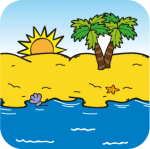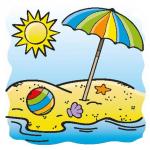Summer Adventures in Grammar: Exciting Activities for KS1 Children
As the school year comes to an end and the sunny days of summer approach, it's the perfect time to engage children in fun and educational activities that will boost their literacy skills. In this blog, we will explore a range of exciting grammar activities with a summer twist.
By incorporating these activities into your lessons, you can create a stimulating learning environment for writing during the summer months and encourage children to practice grammar in a playful and exciting manner.
Fun with Summer Nouns
In this activity, children will explore summer nouns and enhance their vocabulary while practising grammar.
Start by creating a list of summer-related nouns on the board, such as beach, sun, ice cream, and sandcastle. Encourage the children to brainstorm more nouns and add them to the list. Next, divide the class into small groups and provide each group with a set of flashcards or pictures representing the summer nouns. The children can take turns picking a flashcard or picture and using it in a sentence. For example, if a child picks the flashcard with 'beach,' they could say, 'I love building sandcastles at the beach.' This activity not only reinforces grammar skills but also promotes creativity and imagination.
To make it more challenging, you can introduce adjectives into the activity. Ask the children to select an adjective flashcard or come up with their own and use it to describe the summer noun. For instance, 'I love eating delicious ice cream on a sunny beach.' This adds a layer of complexity and encourages the children to think more critically about their sentence structure.
Summer Sentence Scramble
In this activity, children will have fun unscrambling summer-themed sentences while practising their grammar skills.
Start by creating a set of sentence cards with summer-related sentences that are jumbled up. Each sentence should contain several words that need to be rearranged to form a coherent sentence. For example, a sentence could be 'The sun is shining brightly.' Mix up the words on the card so that it reads 'Brightly the is shining sun.'
Divide the class into pairs or small groups and distribute the sentence cards. The children will then work together to unscramble the words and rearrange them into a correct sentence. As they unscramble the sentences, encourage the children to pay attention to grammar rules, such as capitalisation and punctuation.
Once the groups have unscrambled their sentences, they can share their results with the class and discuss any interesting or funny sentences they found. This activity not only reinforces grammar skills but also promotes teamwork and problem-solving.
Summer Mad Libs
In this activity, children will have a blast creating silly summer stories while practising their grammar skills.
Start by providing each child with a summer-themed Mad Libs worksheet. The worksheet should contain a short story with blank spaces for nouns, verbs, adjectives, and other parts of speech. The children will then take turns asking their classmates for words to fill in the blanks. For example, a child might ask, 'Can I have a noun?' or 'I need a verb ending in -ing.'
As the children fill in the blanks, they will be practicing their knowledge of different parts of speech and sentence structure. Once all the blanks are filled in, ask the children to read their hilarious summer stories aloud to the class. This activity not only reinforces grammar skills but also encourages creativity and storytelling.
Punctuation Picnic
In this activity, children will have a picnic while practising their punctuation skills.
Start by setting up a picnic area in the classroom or outside, complete with blankets, cushions, and picnic props. Before the picnic, prepare a set of sentence cards that require punctuation. These sentences can be summer-themed or related to picnics, such as 'I love eating watermelon on a sunny day' or 'The ants are marching towards the picnic basket.'
Divide the children into pairs or small groups and distribute the sentence cards. The children will take turns reading the sentence aloud and identifying the correct punctuation marks that are missing. For example, they might need to add a full-stop, question mark, or exclamation mark. Once they have identified the missing punctuation, they can use a small whiteboard or paper to write the corrected sentence, including the appropriate punctuation.
After each pair or group has completed their sentences, they can share them with the class and discuss any interesting or funny picnic-themed sentences they came up with. This activity not only reinforces punctuation skills but also provides a fun and interactive way for children to practice their grammar.
Beach Ball Verbs
In this activity, children will have a ball while practising their verb skills with a beach-themed twist.
Start by inflating a beach ball and writing different verbs all over it with a permanent marker. Words like 'swim,' 'jump,' 'run,' 'splash,' and 'build' are great choices. Divide the class into small groups and have them stand in a circle. Each child will take turns tossing the beach ball to another child. When a child catches the ball, they must look at their hand placement and read the verb closest to their thumb. They then have to create a sentence using that verb. For example, if they catch the ball and the verb closest to their thumb is 'swim,' they might say, 'I love to swim in the ocean during the summer.'
This activity not only reinforces verb skills but also improves hand-eye coordination and encourages active participation.
To make it more challenging, you can introduce different tenses of the verbs. Ask the children to conjugate the verb they catch in past, present, or future tense. For instance, if they catch the ball with the verb 'jump,' they could say, 'Yesterday, I jumped off the diving board,' or 'Tomorrow, I will jump over the waves.' This adds complexity and allows children to practice verb conjugation in a fun and interactive way.
These summer-themed grammar activities are a fantastic way to engage KS1 children in fun and educational learning during the summer months. By incorporating these activities into your lessons, you can create a stimulating environment for writing and boost literacy skills in a creative and enjoyable way. So, grab a beach ball and get ready to have a blast while practising grammar!
Looking to engage your class in literacy like never before?
Discover Mighty Writer today! Mighty Writer is an exciting, visual teaching resource which simplified the process of learning to write!
Click below to discover more.
